Whenever you see a wasp buzzing around you, it’s natural to flee out of fear. You may worry about the wasp and the possible consequences of a sting. However, the question is; can wasps smell fear?
No, wasps can’t smell fear irrespective of sharp senses. They can’t feel fear in the same way that you do. However, wasps can react to certain cues and stimuli. They are generally more aggressive and defensive when they feel threatened.
Are you interested in knowing more about the wasp’s fear and other senses? If so, stick around to the conclusion of the article to learn the nuts and bolts.
How Does a Wasp Sense Fear?
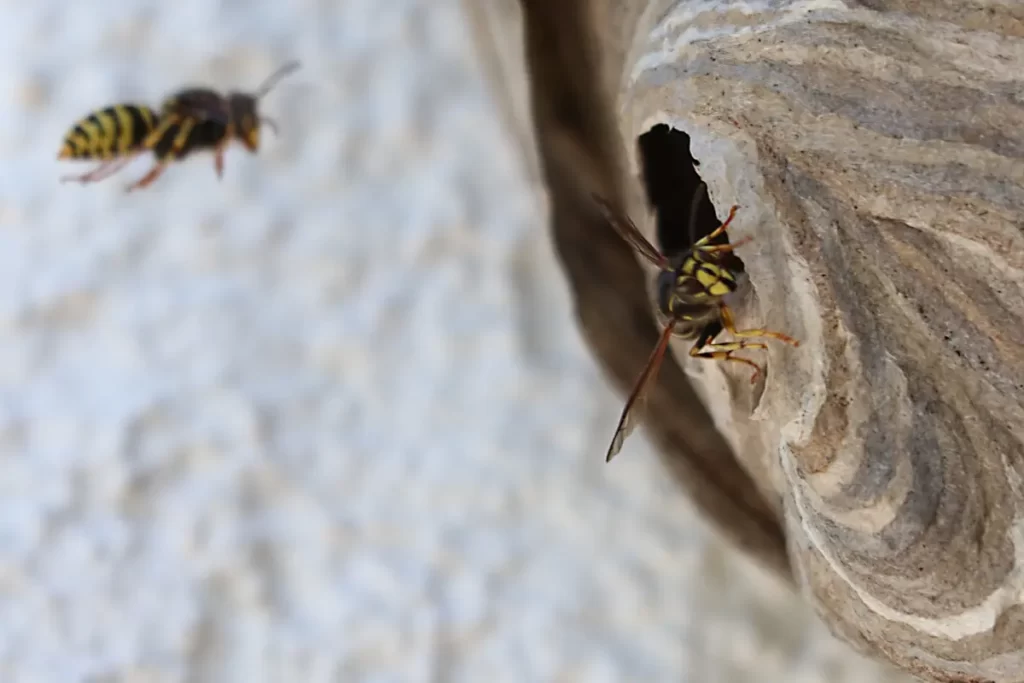
Wasps can’t feel fear the same way as people or some other creatures do. Instead, they are more attuned to specific chemical signals and physical cues. They do not possess complex emotions or cognitive processes required to recognize and respond to fear.
However, wasps can be sensitive to certain chemical signals and environmental cues. For example, they may react to the release of alarm pheromones by other wasps, which can happen if they perceive a threat or danger nearby. These pheromones are substances released by distressed or threatened wasps that can cause adjacent colony members to mount a defense.
Additionally, wasps have a keen sense of vibrations and motions in their environment. They may respond defensively to sudden, erratic movements or disturbances close to their nest because they see them as potential dangers.
Senses of a Wasp
Wasps have specialized senses that help them navigate and interact with their environment. Below are some of the senses of a wasp:
Smell
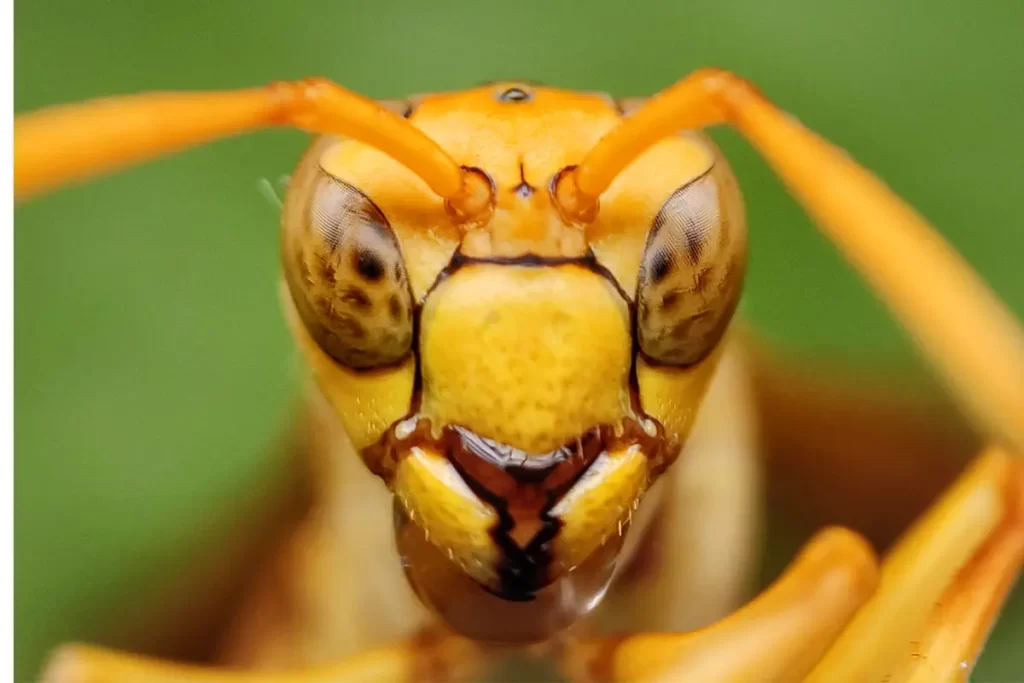
Wasps possess an acute sense of smell. They use this olfactory ability to navigate their environment, find food, locate mates, and identify potential threats. Wasps possess specialized sensory organs called antennae that are covered in tiny hairs called sensilla, which house olfactory receptors. These receptors are sensitive to chemical cues in the environment, allowing wasps to detect odors.
Wasps draw to specific smells, including floral aromas, sweet compounds, and chemicals given off by other insects. Due to their ability to find prospective food sources far away, this is essential to their foraging activity.
Overall, the sense of smell is a vital sensory tool for wasps, helping them navigate their environment, find resources, communicate with their colony members, and respond to various ecological cues.
Vision
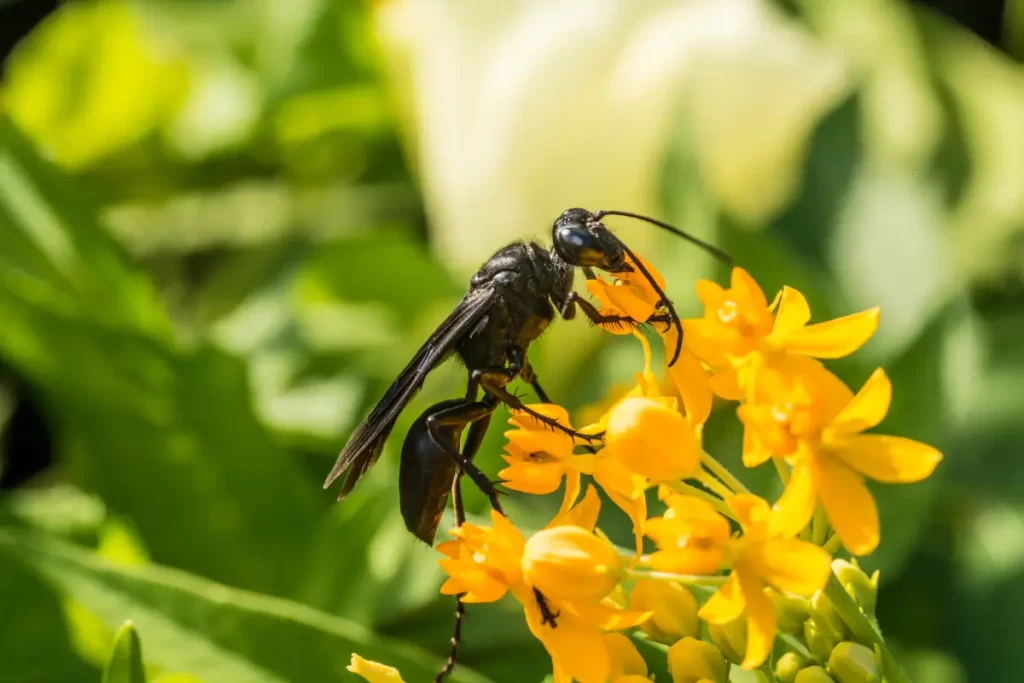
Wasps have compound eyes composed of numerous tiny components called ommatidia. Each ommatidium has a unique lens and photoreceptor cells. Due to this structure, they have a broad range of views and good motion detection.
Despite having compound eyes, wasps’ vision is not as precise as a human’s. Instead, they are very good at spotting movement which is essential for activities, like spotting prey or navigating their habitat. Moreover, they rely on visual cues and photographic memory to navigate because they have low-resolution eyesight.
Nevertheless, some wasps, like paper wasps, have reasonably good color vision, which aids with flower identification and the location of food sources.
Touch
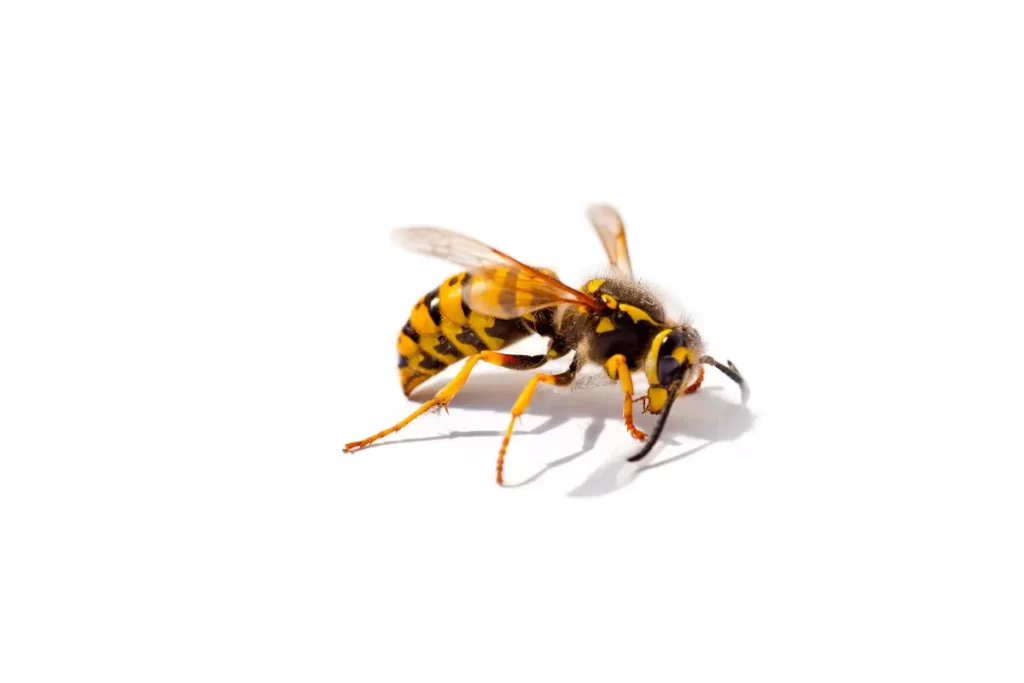
Wasps have sensory organs that allow them to feel their environment, including with their hands. Their legs, mouth, and antennae are only a few body components that have sensory organs.
A wasp’s sense of touch depends heavily on its antennas. They are covered in tiny, sensitive hairs and are used to detect changes in the air, temperature, humidity, and physical contact with objects or other insects.
Moreover, wasps use their legs not only for walking and climbing but also for tactile exploration. The tarsi, or the last segments of their legs, have specialized structures called sensilla. These sensillas are tiny sensory organs that can detect mechanical stimuli, such as vibrations or contact with surfaces.
Taste
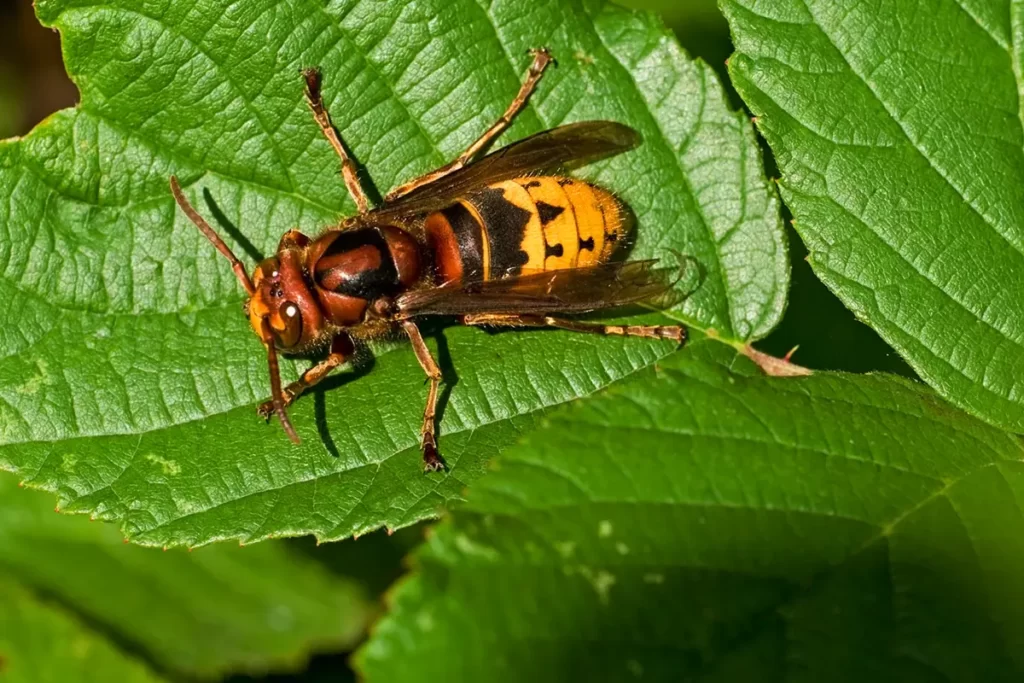
Wasps’ taste receptors also known as gustatory receptors present not only on their mouthparts but also on other parts of their body, including their antennae, legs, and ovipositor.
These taste receptors help wasps in detecting chemical signals in their environment. They use this ability primarily to identify suitable food sources. For example, when a wasp lands on a potential food item, it may use its mouthparts to probe the substance while also using its other body parts to sample and assess the chemical composition. Furthermore, it will likely continue feeding if it detects sugars or other desirable nutrients.
What Fear Do Wasps Have?

Like many other animals, wasps have a strong innate need to protect themselves. Their main concerns are dangers to their security, nest, and colony. The following are a few wasps’ typical worries and fears:
- Predators: Natural predators like birds, larger insects, and certain mammals pose a significant threat to wasps. When wasps detect the presence of a possible predator, they are likely to show signs of fear.
- Flowers and Herbs: Wasps don’t like the smell of certain flowers and plants, like spearmint, eucalyptus, thyme, and lemongrass. So, whenever you plant them in your yard, they flee from fear.
- Environment Changes: Sudden changes in the environment, such as loud noises, vibrations, or strong winds, can startle and stress wasps.
- Chemicals: Wasps communicate using chemical signals called pheromones. When they detect certain pheromones released by other wasps (which might indicate danger or distress), it can trigger fear or defensive behavior.
What Should You Do If You are Afraid of Wasps around You?
It’s critical to put your safety first if you’re terrified of wasps or find yourself in an environment where they are present. Here are some ways to overcome the wasp’s fear:
- Stay Calm: Sudden movements or loud noises can agitate wasps and make them more likely to sting. That’s why you have to stay calm whenever you see wasps.
- Avoid Swatting: Do not try to swat at the wasps. It might enrage them and make you more likely to be stung.
- Move Slowly: If you want to leave the area, do so slowly and deliberately. Avoid making sudden or jerky movements.
- Find Shelter: If at all feasible, take cover inside a car or a building. It will act as a protective shield between you and the wasps.
- Cover Up: If you can’t locate shelter, attempt to keep as much of your skin covered as you can. Put on long sleeves, long pants, and closed-toed shoes. It will add another layer of defense.
- Avoid Bright Colors and Floral Patterns: It is advisable to wear neutral or light-colored clothing because wasps are drawn to vivid hues and flowery designs.
- Do Not Disturb Nests: Avoid attempting to remove or disturb a wasp nest if you know where it is. It may lead to aggressive behavior from the wasps.
- Use Repellents: Additionally, if you’re going to be in an area where wasps are likely to present, consider using insect-repellent sprays or lotions.
Do Wasps See at Night?

No, wasps can’t see at night. They use light to find food and travel. However, they have some degree of low-light vision, which enables them to see in low-light situations, like at dawn or twilight.
Being a diurnal insect, wasps are most active during the daylight hours when there is ample light. Their compound eyes, which are made up of several small lenses called ommatidia, have a large field of vision that enables them to detect movement, find food sources, and traverse their environment during the day.
Wasps are typically less active and less adept at making use of their vision in low-light situations or at night. They rely more on their other senses, such as touch and scent, to navigate in the dark. Some wasp species may also look for shelter and rest during the night.
Is a Wasp Active at Night?
No, wasps are not active at night because being diurnal, they are awake during the day and asleep at night. In the daytime, they frequently fly around in search of food, constructing nests, and participating in other social activities.
But there are a few exceptions. Particularly, if they are scavenging for food or constructing their nests, some wasp species, like hornets, may be active in the early evening. Additionally, there are a few wasp species that are nocturnal and have evolved to be active at night.
Although it’s uncommon for most wasp species to be active at night, there are some exceptions depending on the particular wasp species and its habits.
Do Wasps Remember Human Faces?

There is no scientific proof that wasps can recognize and remember human faces in the same way that people can. Wasps do not have the same level of cognitive capacity as humans or certain other unusual species.
Wasps largely use innate activities to explore their surroundings and locate food. Compared to the sophisticated brains of animals with superior cognitive ability, such as humans and some other mammals, their brains are significantly less complicated in structure.
While wasps can learn and recall certain patterns or locations connected to food sources, their capacities in this regard are restricted to simple correlations and do not involve the recognition of specific faces. They are more likely to react to specific movements that they perceive as threats rather than recognizing a person’s face.
Why Does a Wasp Follow You?
Wasps may follow you for many reasons, but it’s important to understand that they may not necessarily interested in you. Here are some typical explanations for why a wasp can appear to be following you:
- Certain foods and smells are attractive to wasps. They might be drawn to you if you are consuming sweet foods or beverages, such as fruit or sugar-sweetened drinks.
- A wasp may grow agitated and follow you out of a defensive reaction if you swat at it or make rapid movements.
- Wasps are curious insects and may investigate objects or people that seem interesting to them. If you’re wearing bright colors or have something shiny, a wasp might investigate out of curiosity.
- Social wasp species, like yellowjackets, may become more aggressive and follow you if they perceive you as a threat.
- Furthermore, wasps can navigate well and may take a course that seems safe or promising. It may follow you if you’re walking down a path where it is flying.
Does a Wasp Kill You?

The majority of the time, a single wasp sting is not fatal, but it can be very painful and can result in an allergic reaction. However, multiple stings, stings in delicate places, and stings from extremely venomous species can be more harmful.
In rare cases, some individuals may experience anaphylaxis, a severe allergic reaction to wasp stings that can be fatal if left untreated. The signs of anaphylaxis can include trouble breathing, a rapid drop in blood pressure, hives, and unconsciousness.
When in regions where wasps are active, remember to take precautions, such as wearing protective clothes and avoiding rapid movements that can spook them. So, to remove a wasp nest safely, it’s best to get in touch with a reputable pest control company.
Do Wasps Know When You Kill One?
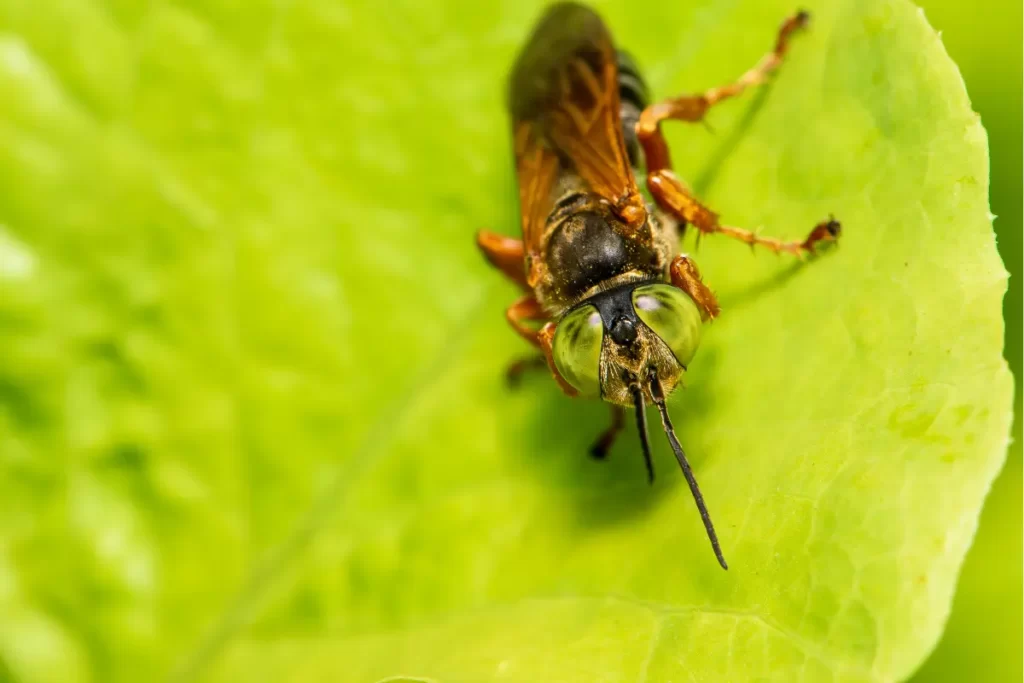
Wasps do not possess the cognitive capacity for complex emotions or self-awareness as humans do. Therefore, they can’t understand death or comprehend when one of their own has been killed.
However, they release special chemicals called pheromones to alert other wasps when they feel threatened. Furthermore, wasps don’t have a collective awareness or sharp mind like social insects, thus they don’t share information in the same way.
It’s important to keep in mind that wasps have a defense instinct and may act more aggressively if they feel threatened by you. However, it doesn’t indicate to them “knowing” that you killed one of their kind; it’s simply a response to perceived danger.
Will Wasps Leave You Alone if You Don’t Bother Them?
Yes, wasps will leave you alone if you don’t bother them. Wasps are generally not hostile and don’t sting people unless they feel threatened or provoked. It’s advisable to maintain your composure and avoid making abrupt movements or loud noises if you come across a wasp nest or a group of wasps because these actions may be seen as a threat.
Although the majority of wasps prefer to conduct their business without troubling people, it is still advisable to use caution, especially if you are aware of a nest nearby. Wasps may become more aggressive and sting in self-defense if you disturb their nest or make them feel threatened.
It’s preferable to call a reputable pest control company to securely remove a wasp nest if you discover one in your home rather than trying to handle it yourself. You are less likely to get stung, and the wasps are protected as well.
Bottom Line
Wasps are one of the most annoying household pests. Although it’s natural to fear wasps, they don’t bother you until you tease them. Additionally, wasps largely use their vision and chemical cues to navigate their surroundings and communicate with other wasps.
It’s crucial to keep in mind that wasps might become more hostile toward people when they sense a threat or when their nest is disrupted when it comes to wasp interactions with people. Instead of a human-style reaction to fear, this aggression is a defense mechanism that occurs naturally.
Therefore, if you encounter a wasp, it’s best to remain calm and avoid making sudden movements.

